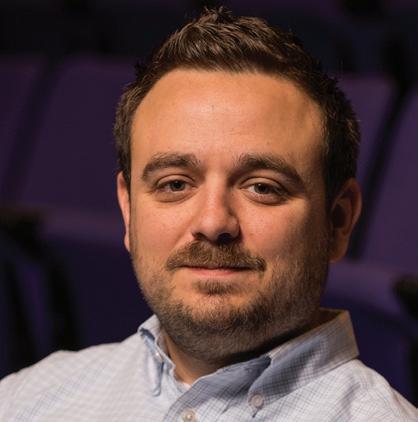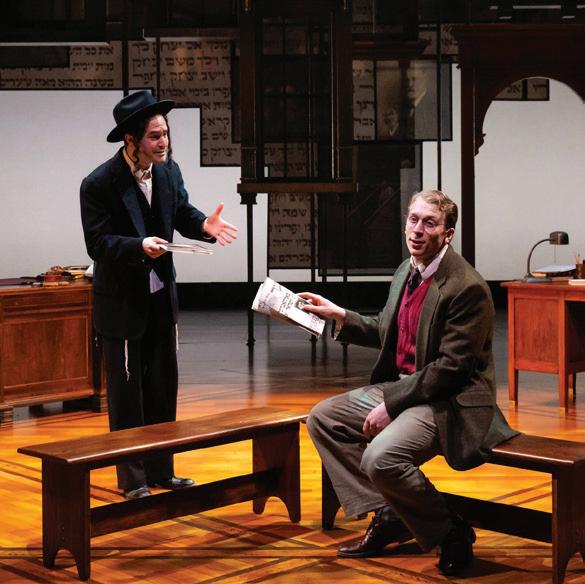INKdrama

The donor newsletter of Milwaukee Rep


The donor newsletter of Milwaukee Rep
Dear Friends,
This continues to be a very exciting time for Milwaukee Rep. We recently opened The Chosen, in partnership with the Milwaukee Jewish Federation. Later this month, we will bring back the smash hit Piano Men 2 featuring Steve Watts and Kenney Green-Tilford. Next month, we will open our production of Nina Simone: Four Women, which will be the last production to appear in our Quadracci Powerhouse as it exists today. Starting in May, we will break ground on our new Associated Bank Theater Center and begin construction of the new Ellen & Joe Checota Powerhouse Theater.
In February, we hosted our annual Limelight Legacy Society Luncheon, a benefit for individuals who include Milwaukee Rep in their estate plans. This year, the speaker was former Managing Director Sara (Tonen) O’Connor, who shared her experiences leading Milwaukee Rep through a period of great transformation. It was under her leadership that Milwaukee Rep converted an abandoned power plant into a theater complex and established its endowment.
and the Sharon Lynne Wilson Center. Our website will continue to have updates about parking, directions, seating, and other frequently asked questions.

We recently announced our exciting 2024/25 Season featuring 11 breathtaking productions and our annual holiday classic, A Christmas Carol. Because the Powerhouse Theater will be under construction during the entire season, all of our typical Powerhouse Theater productions will take place across different venues, including our Stiemke Studio, the Wilson Theater at Vogel Hall inside the Marcus Performing Arts Center,

We are currently more than 90% toward raising our goal of $78 million for our Powering Milwaukee Capital Campaign. Nearly 500 individuals, corporations and foundations have supported the new complex. What is most impressive is that this was accomplished without any government funding. In fact, the Associated Bank Theater Center is the only cultural infrastructure project in the nation without an investment from federal, state or local government. Wisconsin ranks dead last among all 50 states for financial support for public arts and culture, spending only 18 cents per person. This means that Wisconsin spends less on arts and culture than Mississippi, Wyoming, and Alaska. In contrast, our neighboring states of Iowa, Illinois and Minnesota spend 46 cents, $1.08, and $7.36 per person, respectively. At Milwaukee Rep, less than 1% of our total income comes from government support. Executive Director Chad Bauman recently traveled to Madison to advocate for critical updates to the governance of the artistic endowment to lay the foundation to receive funding in the near future.
You can take action by contacting your representatives and telling them how important it is to invest in Wisconsin’s arts and culture industry. With your assistance, we can ensure that Wisconsin’s next generation will enjoy the world-class cultural assets that we have.

This spring, all three productions in the Quadracci Powerhouse - Little Women, The Chosen, and Nina Simone: Four Women – are co-productions with other theaters from across the country. A co-production is a collaboration between two or more theaters who pool their resources and expertise to produce a high-quality theatrical production that will be performed at each theater. It involves a shared investment, both artistically and financially, to bring a production to life. By sharing the cost of production elements such as sets, costumes, and props, as well as technical equipment and rehearsal spaces, theaters can stretch their budgets further and invest in higher production values. Co-productions are especially helpful while the theater industry continues to recover from the effects of the COVID-19 pandemic.
Typically, the team that will host the production on their stage first will take the lead throughout the planning process. However, creating a successful co-production requires careful planning, collaboration, and coordination between all parties involved. All throughout the casting, designing, and rehearsal periods, the artistic directors from both theaters will work closely together to develop a unified vision for the production. They collaborate on key artistic decisions such as casting, set design, and overall creative direction.
The technical teams, including designers, stage managers, and technicians, collaborate to create a production that will fit in both performance spaces. Months in advance of any performances, the technical teams will begin communicating about the production to ensure the transition from one theater to another goes as smoothly as possible. This involves coordinating set, costume, and props shipments, rehearsal and performance schedules, sharing any specialized technical equipment needed for the show, and troubleshooting technical elements. For example, when our recent production of Little Women traveled to us from Seattle Rep, our team discovered that the machine that opened the red curtain automatically was too short for our stage, and left the curtain partially closed. Our team adjusted to a manual curtain instead, meaning that a crew member backstage pulled on a rope to open and close the curtain all the way.

Milwaukee Rep also has an added challenge when creating co-productions, because our Powerhouse stage is a different layout to most other regional theaters in the nation. We have what is called a thrust stage, which means that the stage is surrounded on three sides by the audience. Most other theaters have what is called a proscenium stage, where the audience is seated in front of the proscenium arch, or the structure in front of the stage that frames the action of the play. During Little Women, scenic designer Collette Pollard designed a set which could be flexible enough to fit into both theater configurations. At Seattle Rep, the entire set and all of the action took place behind the proscenium arch. At Milwaukee Rep, the set was in line with the proscenium arch and the action took place on the thrust part of the stage. Because of this change, actors made most of their entrances and exits from the vomitorium tunnels under the seats instead of from either side of the stage.
Co-productions allow theaters to collaborate with artists from all across the country with different backgrounds and perspectives. This collaboration can lead to fresh and innovative interpretations of plays, pushing the boundaries of traditional theater. Co-productions exemplify the power of collaboration and innovation in the theater industry, and we are grateful to our partner theaters across the US.
you are out to lunch with a friend and you get a call from the stage manager. They tell you that one of the cast is out sick and you have to step in for them at the matinee. In two hours. You rush to the theater where the team is waiting to quickly rehearse fight choreography and quick costume changes with you. There is no time for you to do a rehearsal of the full play – let us hope you remember your lines.

This is the case for Emerging Professional Residents (EPR) like Daniel Mejil, who serve as understudies to make sure that the show does, in fact, go on.
The Emerging Professional Resident program is an apprenticeship program that serves as a bridge into the professional theater world. Each season, 20 of the nation’s up-and-coming theater artists spend several months at Milwaukee Rep working with our world-class theater artists and learning what it takes to work as a professional artist. These residencies can include Acting, Directing, Education & Engagement, Costume Construction, and Stage Management.
Daniel joined Milwaukee Rep as an acting EPR during the 2023/24 Season. A major element of being an acting EPR is serving as an understudy for our productions throughout the season. This fall, Daniel was cast as the understudy for Father
Virgil in Nuncrackers, as a regular member of the ensemble as well as an understudy for Old Joe and Fred in A Christmas Carol , and as the understudy for Laurie and Mr. Lawrence/ Robert March/Doctor in Little Women. This means that Daniel had to have lines memorized for seven different characters in three different plays at the same time.
In addition to memorizing multiple roles, understudies also have significantly shorter rehearsal periods than the cast. For Nuncrackers, Daniel and the other EPR understudies observed regular rehearsals from day one and had their own rehearsals either before or after the regular rehearsals, learning what the main cast worked on the day before. However, rehearsals for A Christmas Carol and Little Women were significantly shorter. A Christmas Carol is only in rehearsal for about two weeks before it moves into the Pabst Theater. During this time, EPRs who have both a regular ensemble role and understudy roles like Daniel will typically take one week to learn each. Coproductions which have performed at other theaters before coming to Milwaukee Rep typically move almost directly into technical rehearsals. This was the case for our production of Little Women. This meant that the understudies had only five days to observe the main cast before the show opened in front of an audience.
When an understudy is told by the stage manager that they will be going on, they usually do not have much time to prepare. In some shows, an understudy may even have to step in after the show has already begun. In an ideal world, when an understudy will be going on, they will have what is called a “put in” rehearsal prior to the performance. If there is time, this could be a rehearsal of the entire show from start to finish in the performance space. More often, they only rehearse key moments such as costume changes or areas that might be a safety concern such as fight scenes with swords, slaps, or more.
For most productions, audiences will never see the understudies take the stage. But when an actor does miss a performance, this can be an understudy’s opportunity to shine.
In Daniel’s case, he performed three times as Father Virgil in Nuncrackers. Since he was regularly cast in the ensemble of A Christmas Carol , this meant that another understudy had to take over his role. During Little Women, Daniel was called to take over for Mr. Lawrence/Robert March/Doctor during technical rehearsals immediately after the show arrived in Milwaukee from Seattle Rep. While the rest of the cast had been rehearsing and performing the show for two months in Seattle, Daniel stepped onstage with no prior rehearsal. He then played Laurie for all four performances during opening weekend.
For the past two seasons, Milwaukee Rep has hired more understudies than ever before to prevent us from having to cancel a performance. Understudies are a crucial component to ensuring that performances can go ahead as scheduled when a cast member is sick or injured, and we are so grateful to the talented performers like Daniel who can jump in at a moment’s notice to save the day.















 The understudy cast of Little Women in the rehearsal room.
Rayven Craft
Audrey Erickson
Asa Fris
Star Howard Micaela Johnson
Juliz Kuzmich
Elizabeth Martinié
Daniel Mejil
Ethan Smith
Natalie Rich
Mizha Overn
Carmen Cecilia Retzer
Jonathan Riker
Jessica Wexler
The understudy cast of Little Women in the rehearsal room.
Rayven Craft
Audrey Erickson
Asa Fris
Star Howard Micaela Johnson
Juliz Kuzmich
Elizabeth Martinié
Daniel Mejil
Ethan Smith
Natalie Rich
Mizha Overn
Carmen Cecilia Retzer
Jonathan Riker
Jessica Wexler
You are invited to help Milwaukee Rep power to the finish of its once-in-a-generation $78 million capital campaign to build its state-of-the-art new home.
We have raised 92% of our goal and with your help, we will finish strong! Make your gift today to name a seat in the new Associated Bank Theater Center. Pledges can be paid over a period of up to five years.
Choose from these options:
• Ellen & Joe Checota Powerhouse Theater
¤ $15,000 – VIP Circle
¤ $10,000 – Orchestra
¤ $5,000 – Balcony
• Herro-Franke Studio Theater - $5,000
• Stackner Cabaret - $5,000
You may wish to name a seat to:
• Honor a loved one or your entire family
• Give a unique gift
• Commemorate a special occasion

Your Info Here
Thanks to the generosity of campaign leadership, all new or increased gifts will be matched dollar for dollar if pledged before May 1, 2024.
For more information and to make a gift to name a seat, follow the link below or contact Chuck Rozewicz, Chief Development Officer at crozewicz@milwaukeerep.com or 414-290-0717.
Naming opportunities for public venues in the new theater center are also available starting at $100,000. To learn more, visit:
www.MilwaukeeRep.com/TakeASeat
For a “typical” show (if there is such a thing), the rehearsal process takes about 5 weeks.

For the first few days of rehearsal, the cast and directing team all sit down, read through the script, and then break the lines down one by one to make sure everyone understands what they are saying and how it contributes to the story. Actors will typically have character meetings with the director during this time to make sure everyone knows who their character is and how they are going to portray those characters onstage.
During this week, the director will work with the actors to do what we call “staging” the play, figuring out where they will move and when starting from the beginning of the show. At this point, the director usually has a good idea of where key moments are going to happen based on the set or lighting design, but we still consider this first attempt at staging a “rough draft,” and will make changes throughout the process based on the needs of the actors, props, costume changes, lighting and set changes, or other factors as they come up throughout the process.
This is when we really start getting into detail. Throughout this week, we start going through the show from start to finish in the rehearsal room, figuring out what’s working and what isn’t in terms of the staging and technical elements, as well as acting and character choices. Actors usually put down their scripts at this point and have their lines memorized. At the end of week 3, we have what we call a “Designer Run,” where all of the designers (scenic, costume, lighting and sound) gather to watch the actors rehearse the show so that they can see if anything needs to be adjusted based on an actor’s performance.

During tech week, the actors move from the rehearsal hall into the performance space and all of the technical elements are brought together for the first time. One by one, the technicians and actors try out every element of the show and make adjustments – from every time the lights change to precisely when they change to how bright they should be or what color, tech week is all about attention to detail and bringing the world of the play together. This is crucial to make sure that each element of the show is executed perfectly and serves the story we are trying to tell. The final puzzle piece to be added during tech week is typically the costumes. This is why our final rehearsals are referred to as “dress rehearsals.”

Just five short weeks after actors have joined us in the rehearsal room, they are performing before an audience for the first time. During previews, we get to see how audiences react to the work, and sometimes they surprise us! We typically hold three preview performances before Opening Night, during which time the actors may adjust their performance depending on the audience’s reactions, such as waiting to deliver a line while the audience laughs at something. Once a show is opened, no more changes can happen and at that time, the designers and directors leave.
Every show and every director may have a slightly different process, but the rehearsal process is always a collaborative effort from start to finish.
March 25
Dinner Dialogues for The Chosen
5:00-8:00pm at Friendship Circle of Wisconsin
Cost: $35
April 9
Book Club: “Nina: A Story of Nina Simone”
5:30-6:30pm at Central Library
Cost: FREE
April 18
PRIDE NIGHT for Nina Simone: Four Women
6:00pm Reception in the Quadracci Powerhouse
Cost: $30 and includes a ticket to the performance
For more information about these upcoming events and to register, visit www.MilwaukeeRep.com.
Help ensure world-class theater and arts education for your community with an easy and convenient recurring gift!
• Smaller recurring gifts are easier on your budget
• Build your credit card reward points
• Your gift will be renewed automatically every 12 months.
• Your card will be charged around the 1st or 15th of each month based on your preference.
• You can increase, decrease, or cancel your monthly gift at any time.
• You will receive a full statement each January for tax purposes.
For more information, contact the Development Department at 414-290-5376.
April 19
Opening Night: Nina Simone: Four Women
6:00pm: VIP Opening Night Dinner
8:00pm: VIP Opening Night Performance
Donor benefit for donors who contribute $5,000 or more annually
April 23
Post-Show Panel Discussion: The Role of Music in Activism
Following the 6:30pm performance of Nina Simone: Four Women in the Quadracci Powerhouse
Cost: FREE
April 29
Dinner Dialogues for Nina Simone: Four Women
5:00-8:00pm at Coffee Makes You Black
Cost: $35
108 E. Wells Street • Milwaukee, WI 53202
Chuck Rozewicz Chief Development Officer crozewicz@milwaukeerep.com
Amy Dorman Director of Development adorman@milwaukeerep.com
Cassidy Skorija Director of Major and Planned Giving cskorija@milwaukeerep.com
Morgen Lucas
Associate Director of Development, Events & Stewardship mlucas@milwaukeerep.com
Megan Newbanks
Associate Director of Development, Institutional Giving mnewbanks@milwaukeerep.com
Amy McGuire Development Database Manager amcguire@milwaukeerep.com
Yolanda Doney Development Associate ydoney@milwaukeerep.com
Madelyn Davenport Donor Relations Representative mdavenport@milwaukeerep.com
To make a gift in support of Milwaukee Repertory Theater, please contact the Development Department